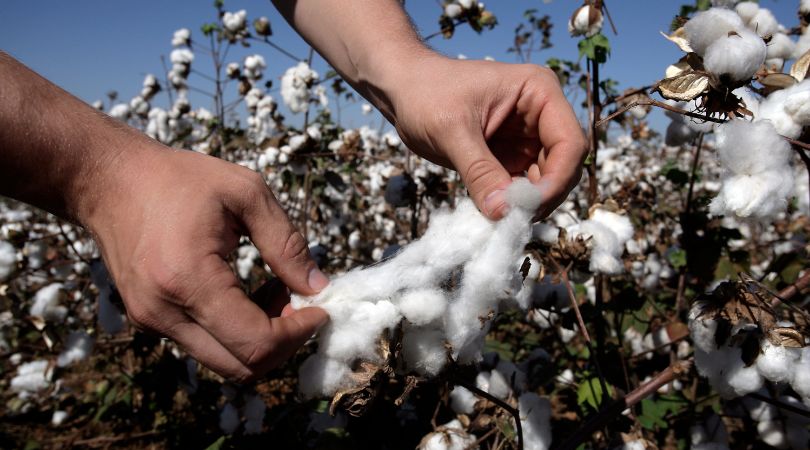Much like in the case of wool and Econyl, green-minded fashion enthusiasts have been raving about the softness and durability of organic cotton for quite some time. From ultra-comfy sustainable men’s jeans and eco-friendly shoes to non-toxic mattresses and beyond, seems like organic cotton has concurred in pretty much every industry. But is it really a better alternative for people and the planet than traditional/conventional cotton? Is Organic Cotton Sustainable and ethical?
By now, you’ve probably heard that traditional cotton is one the most chemically charged crop, consuming around 6% of the world’s pesticides and 16% of all insecticides. Cotton production and manufacturing also heavily contribute to greenhouse gas emissions and pollute thousands of liters of drinkable water. In fact, it’s the most 3rd least sustainable option right after Polyester and Acrylic. And that doesn’t even scratch the surface!
So what makes organic cotton more sustainable than traditional cotton and many other textiles? The answer lies in the farming process.
What Is Organic Cotton & What Makes Cotton Organic?
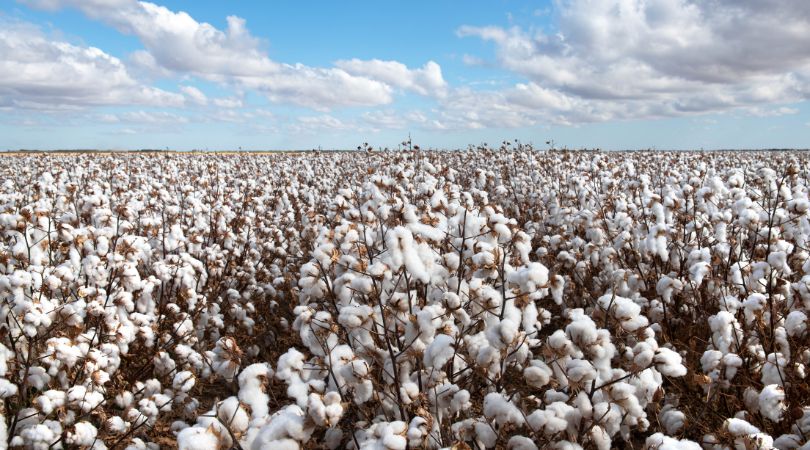
The main difference is that organic cotton is that the latter is grown without the use of toxic chemicals. While the life circle of traditional cotton begins with the growth of genetically modified seeds (with the U.S. Department of Agriculture mentioning that 84 million pounds of pesticides were applied to the nation’s 14.4 million acres of cotton in the year 2000), organic cotton grows naturally, without the use of GMOs.
The corp requires a warm climate with enough sunshine and moderate humidity in order to grow. Once seeds are planted by the farmers, they then turn into adult plants and start to flower which leads to the formation of cotton bolls. The entire process takes about 180 days. As soon as the corp is ready for harvest, farmers then pluck it by hand and stored it in sacks or by utilizing air circulating containers. What’s even more impressive? Due to the GMO-free farming method, organic cotton replenishes and maintains soil fertility to continue the natural circle of life.
Why Is Organic Cotton Expensive?
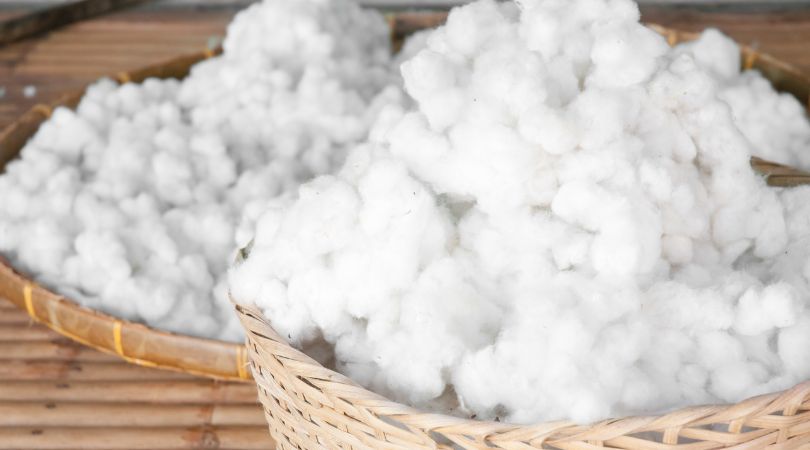
While the production cost of organic cotton is fairly low due to the lack of chemicals, the intensive labor makes organic cotton clothing a bit pricier than most fabrics on the market. Since no herbicides and pesticides are used, farmers have to hand pick hand hoe every cotton crop to get rid of weed growth. Plus, plants typically produce less yield for the same exact reason. Lastly, there is a luck of organic cotton supply in the market because of the slow farming process and which also causes an influx in the price.
Nonetheless, the chemical-free farming process is not the only thing that makes organic cotton susstaibale.
Is Organic Cotton Sustainable? The Benefits
Organic cotton production needs less water
Approximately 10,000 liters of water are needed to produce 1 kilo of traditional cotton. To put it simply, for every cotton t-shirt, 2,700 liters are spent. Now, if we consider that 27 million tons of cotton are produced globally in a year with more than US$2 billion’s worth of chemicals sprayed on the world’s cotton crop yearly, you’ll quickly realize the tremendous environmental impact of conventional cotton. In fact, the industry is not only responsible for the draining of the Aral Sea, but also for contaminating rainwater with over 19 different pesticides.
The production of an organic cotton crop, on the other hand, requires approximately 71% less water than traditional cotton. This is because the first mostly rely on rainwater. And because the process requires less water, energy, and tractor use, the average profit margins are in fact higher for the farmers (between 4 and 30% according to a recent field trial in India).
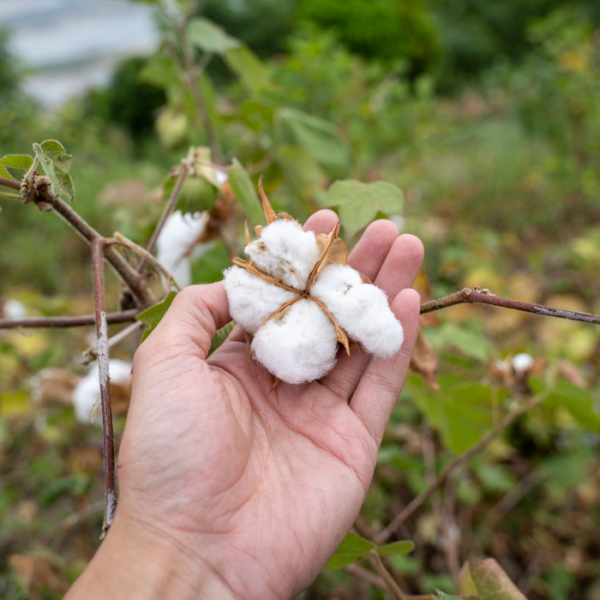
Organic cotton is not harmful to farmers’ health
The Pesticide Action Network UK pointed out that “Nearly 1,000 people die every day from acute pesticide poisoning and many more suffer from chronic ill health.” On top of that, based on a an investigation of Uzbekistan’s cotton thousands of workers have been forced into labor including children by the police, who have been using intimidation and torture tactics.
Organic cotton farming is way safer for the farmers as all manufacturers are obligated to adhere to very strict standards. Farmers aren’t forced to deal with life-threatening chemicals and are paid fair wages. There are plenty of third-party initiatives (like GOTS – Global Organic Textiles Standard) to ensure that ensure the sustainability of the farms these farms.
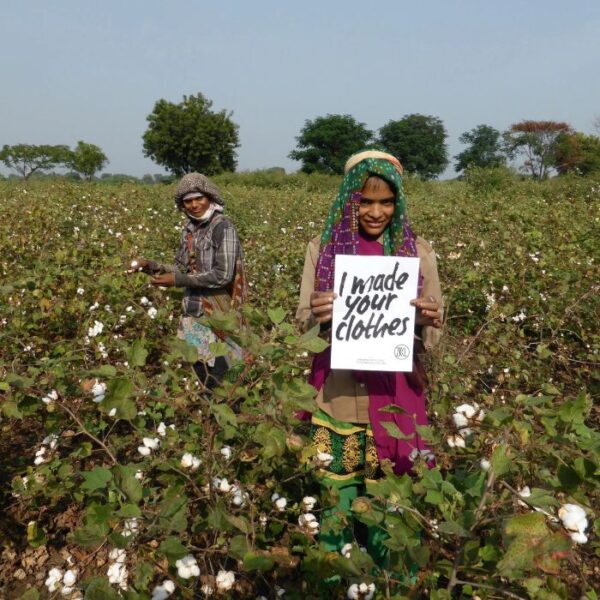
Organic cotton is biodegradable
Organic cotton is plant-based and thus, if no chemicals or synthetic fibers are involved, it can be a fully biodegradable material. The decomposing process usually takes around 5 months and can sometimes happen within one week depending on the amount of oxygen.

Organic cotton is hypoallergenic & soft
While traditional cotton carries a slew of chemicals that can cause rushes to people with sensitive skin, that’s certainly not the case for organic cotton. In fact, it is the most recommended fabric for babies – which are known for having the most sensitive skin.
Unlike traditional cotton, organic cotton is, like we mentioned, handpicked in order to get rid of any damaged fibers that can cause the fabric to feel itsier. Machines usually interfere with the purity of the fibers and, due to the force, intact fibers also often get damaged during the picking process.

Along with bamboo, hemp, and Tencel, organic cotton is amongst the top 5 most sustainable fabrics on the eco market. This fiber is not only produced with no chemicals but also requires significantly lower natural resources during the farming process. Organic cotton is also profitable for the small farmers because, even though labor-intensive, tractor and energy use is very low. Last but not least, organic cotton creates healthy soils, allows farmers to save their seeds year after year, and work with the environment in a long term.


About Author
Konstantina Antoniadou
Freelance sustainability and fashion writer with an ongoing curiosity to explore new innovative technologies, and report on trends in “green” industries.
